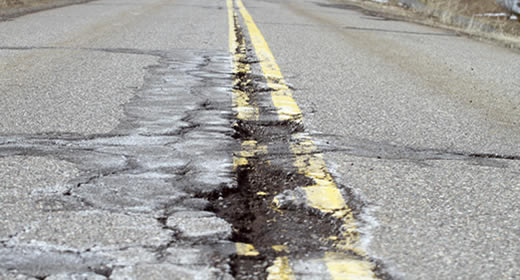
By Greta Guest
Complaining about bad roads in Michigan is about as ubiquitous as grousing about the weather.
How bad are the roads? The Ford School's Center for Local, State, and Urban Policy surveyed top elected and appointed officials in the state's 1,856 units of government on a wide range of road-related issues.
Fewer than one in five local leaders labeled their roads in good condition. The majority said their roads are in fair (57 percent) condition with nearly a quarter rating them as poor.
Jurisdictions with poor road conditions are also more likely to say that within the last five years they have resorted to grinding up paved roads that they can no longer afford to maintain, turning them back into dirt or gravel roads.
There is widespread agreement among local leaders that more state-level funding is needed just to maintain roads, let alone improve them. A strong majority (79 percent) said state-level funding needs to be increased by at least 50 percent to maintain roads.
"Our local leaders say Michigan's roads are not good today, they're getting worse over time, and they will need a major increase in state funding to improve them," said Thomas Ivacko, administrator and program manager of the Ford School's Center for Local, State, and Urban Policy. "However, local leaders are split over how to raise the necessary funding, and less than half support increasing the state sales tax."
With more than 122,000 miles of public roads, Michigan has the ninth-largest public road system in the United States, according to state data. Insufficient funding is a primary reason for Michigan's declining road system. Michigan is 47th among states in highway spending per capita, according to 2013 data from the U.S. Census.
For the last decade, the state of Michigan has raised about $2 billion a year for roads primarily from vehicle registration fees and fuel taxes. If voters approve a statewide ballot proposal in May, about $1.2 billion more a year would be generated to fix roads and bridges.
The poll, part of the Michigan Public Policy Survey series at CLOSUP, reports:
- The majority (52 percent) of local officials said their jurisdictions are mostly or only able to keep up with short-term fixes, such as filling potholes.
- Overall, 65 percent of local leaders said they would have significant problems improving roads and bridges within their jurisdictions if the state does not significantly increase road funding.
- Local leaders were split when asked last fall on their support for a state sales tax increase. Support for an increase came from 43 percent of local leaders, while 38 percent opposed it. They may or may not feel differently about the more complicated plan set for a May 5 statewide vote.
The study, conducted Oct. 6-December 11, 2014, involved surveys sent via hardcopy and the Internet to top elected and appointed officials in all counties, cities, villages and townships in Michigan. A total of 1,356 jurisdictions returned valid surveys, resulting in a 73-percent response rate. The survey had a margin of error of 1.4 percentage points.
More information: